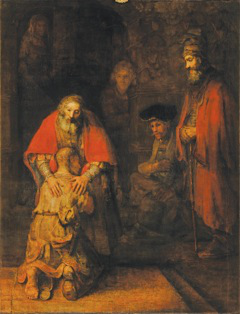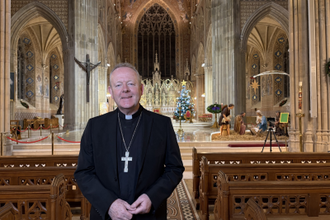Sunday Reflection with Fr Robin Gibbons - 6 March 2016

Rembrandt - Return of the Prodigal
Fourth Sunday of Lent
We can approach Luke's parable of the prodigal son from several angles, the dominant theme of the merciful father or perhaps the reckless abandon and subsequent contrition of the younger son, but it's not often that we focus on the elder child and somehow see his place as central to the story.
It is not a straightforward parable, the demand of the younger son for 'his' inheritance, which he has no real right to demand as the father is far from dead and his older brother is very much alive, hints (at least to me) of a manipulative character who knows that his indulgent father will give him what he wants. I've never really been convinced by the stage performance of his 'conversion' and repentance. True there are elements that point to some degree of self awareness, he is willing to take the blame upon himself for his actions, 'I have sinned' , but it still smacks of the old spoilt self twisting dad around his little finger!
As for the landowner, we discover all kinds of foolish behaviour there towards both sons! But the elder son? I have a huge empathy with him, particularly as I am the oldest of six, so younger siblings behavioural characteristics are well known to me, and have been resented at times. As the oldest a huge amount of responsibility has been put upon his shoulders. In fact he is very much the breadwinner, all that the father has which he will inherit (not the youngest) seems to be diligently cared for. No wonder he is angry at the stupidity of the father who seems irresponsible in giving in to the youngest! Worse still he has him back and who knows what might happen next? More money wasted?
I believe the older son grounds the father, honest and straightforward, a reliable worker, a bit like Peter, a rock on which the future is built, but he lacks that quality of mercy which goes beyond common sense, unable yet to reconcile himself with his sibling, and not ready to grasp the immensity of love, which has no boundaries, present in the father towards them both.
But I believe he takes that step, for ALL the father has is his! As Henri Nouwen puts it: The leap of faith always means loving without expecting to be loved in return, giving without wanting to receive, inviting without hoping to be invited, holding without asking to be held. And every time I make a little leap, I catch a glimpse of the One who runs out to me and invites me into his joy, the joy in which I can find not only myself, but also my brothers and sisters.
I have sinned, O Saviour, yet I know that Thou art the Lover of all. Thou strikest compassionately and pitiest warmly. Thou seest me weeping and runnest towards me as the Father recalling the Prodigal. [Luke 15:20] Canon of St Andrew of Crete.
Fr Robin Gibbons is an Eastern Rite Chaplain for the Melkite Greek Catholics in Britain















